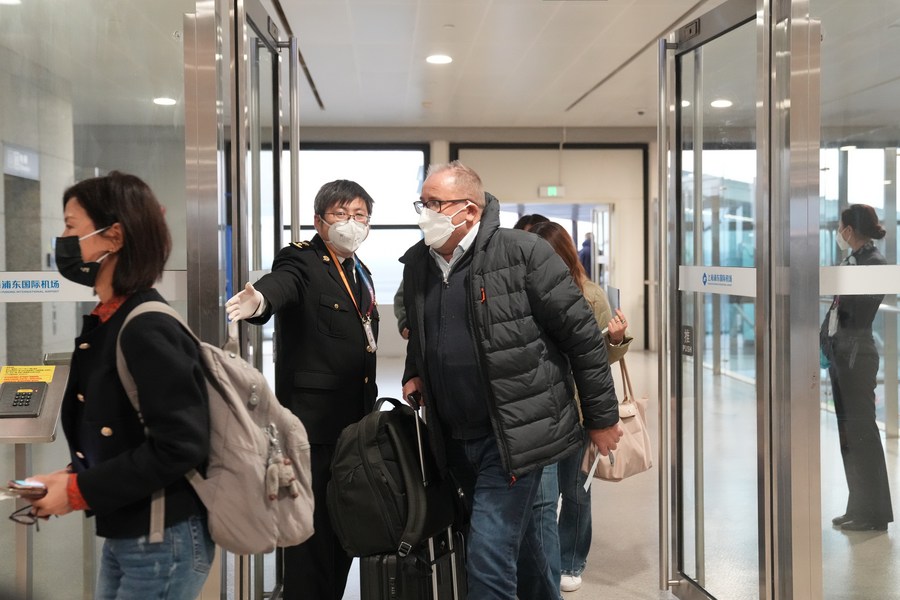China's optimization of COVID response seen as science-based, effective
* In the past three years, China has effectively responded to global COVID waves and avoided widespread infections with the original strain and the Delta variant, which are relatively more pathogenic than the other variants. The country has kept its severe COVID-19 cases and death rates among the lowest in the world.
* China has made an array of active adjustments to its COVID-19 response, including 20 measures in November last year, 10 new measures in December and changing the Chinese term for COVID-19 from "novel coronavirus pneumonia" to "novel coronavirus infection."
* Many experts expressed their confidence that China is returning to its pre-epidemic hustle and bustle, unleashing more economic vitality and opportunities for the world.
China has changed its COVID response in light of the evolving situation, coordinating epidemic prevention and control with economic and social development.
The optimization of China's COVID response policies is science-based, effective and consistent with the country's reality, overseas experts and scholars have told Xinhua.
They also said that China, in the past three years, has made remarkable achievements in fighting the epidemic, making significant contributions to the global battle against the virus.

Inbound passengers arrive at Shanghai Pudong International Airport in east China's Shanghai, Jan. 8, 2023. (Xinhua/Ding Ting)
ACHIEVEMENTS IN ANTI-COVID BATTLE
Since COVID-19 struck, China has put its people and lives first, doing its utmost to protect people's lives and health.
China's anti-COVID experience offers important lessons for many countries, and its optimized COVID-19 strategy is in the right direction, said Antoine Flahault, director of the Institute of Global Health at the Faculty of Medicine of the University of Geneva.
"When the pandemic emerged in Wuhan, the response from the Chinese authorities was quite good," Flahault told Xinhua in a video interview. "The Chinese government did apply very strict and effective measures at the time to tackle the pandemic and to avoid its spread all over the country."
In the past three years, China has effectively responded to global COVID waves and avoided widespread infections with the original strain and the Delta variant, which are relatively more pathogenic than the other variants. The country has kept its severe COVID-19 cases and death rates among the lowest in the world.
Meanwhile, China's average annual economic growth rate over the past three years was approximately 4.5 percent, higher than the global average and making significant contributions to global economic growth.
Faced with the COVID-19 outbreak, China took all necessary measures to stop the rapid spread of the virus, which ensured people's health and enabled the country to play its role in stabilizing the world economy, said Gu Qingyang, director of Chinese Executive Education and associate professor at the Lee Kuan Yew School of Public Policy of the National University of Singapore.
"The pandemic lashed global growth, while China, as the world's second-largest economy, has managed to maintain the stability of the global supply chain with its massive trade, even in 2022 when the Omicron variation hit the country," said Gu, whose research interests lie in Chinese economy, Singapore public policy and urban development.

Tourists enjoy skiing at a ski resort in Beiji Village in Mohe, northeast China's Heilongjiang Province, Jan. 7, 2023. (Xinhua/Zhang Tao)
SCIENCE-BASED COVID RESPONSE
Omicron is much less pathogenic and deadly, and China's treatment, testing and vaccination capacity are steadily rising.
Against such backdrop, China has made an array of active adjustments to its COVID-19 response, including 20 measures in November last year, 10 new measures in December and changing the Chinese term for COVID-19 from "novel coronavirus pneumonia" to "novel coronavirus infection."
Bilal Ahmad, a public health scientist at Pakistan's Central Care, an international non-governmental organization working in health and education, said that countries must be flexible and adaptable in their approach to preventing and controlling the spread of COVID-19.
Ahmad said that China adhered to a scientific approach against the virus since the beginning of the outbreak while employing strong economic fundamentals and measures to stimulate demand.
As China downgraded its management of COVID-19 starting this past Sunday, would-be travelers have been flocking to travel websites, which have seen a surge in inbound and outbound orders. On Monday, Thailand welcomed the arrival of thousands of Chinese tourists in its capital of Bangkok.
However, a few countries have imposed discriminatory entry requirements on travelers from China, which experts and scholars widely opposed.
Hans Kluge, regional director for Europe at the World Health Organization, has urged countries to take science-based precautionary COVID-19 entry restrictions that are proportionate and non-discriminatory.
"For those countries in our region introducing precautionary travel measures at this time, we are calling for such to be rooted in science, to be proportionate and non-discriminatory," Kluge said.
Australia's Chief Medical Officer Paul Kelly also said in a letter to the country's health minister that he does not believe that "there is sufficient public health rationale to impose any restriction or additional requirements on travellers from China."
Health officials in Australian states and New Zealand have reached a "strong consensus" that imposing restrictions on travelers from China was "inconsistent with the current national approach to the management of COVID-19 and disproportionate to the risk," Kelly wrote.

People visit a flower market in Wuhan, central China's Hubei Province, Jan. 1, 2023. (Xinhua/Xiao Yijiu)
ECONOMIC REBOUND
Currently, China's COVID situation is improving, some provinces and cities have passed their infection peaks, and life and work are returning to normal at an accelerated pace.
Many experts expressed their confidence that China is returning to its pre-epidemic hustle and bustle, unleashing more economic vitality and opportunities for the world.
"As China has adjusted its pandemic prevention policies, outbound Chinese tourists will fuel the global tourism industry, and China-related industrial and supply chains will become more stable," Gu said, adding that robust trade with China will bring more vitality to global growth.
"Some international study institutions downgraded the growth forecasts of major economies in 2023, but they are optimistic about China's potential. Their attitude shows that the Chinese economy will be a major power to boost market confidence and global economic recovery," the scholar told Xinhua.
Bambang Suryono, chairman of Indonesia's think tank Asia Innovation Study Center, said China is Indonesia's largest export market, with the two economies highly interrelated and complementary.
China's economic recovery will boost Indonesia's exports to China, Suryono said, adding that the number of Chinese tourists to Indonesia is expected to jump.
Andrei Ostrovsky, chief researcher of the Center for China Socio-Economic Research at the Institute of Far Eastern Studies under the Russian Academy of Sciences, said the adjustment of China's COVID response policies would benefit Russia-China trade and personnel exchanges, and facilitate its contacts with the rest of the world.








